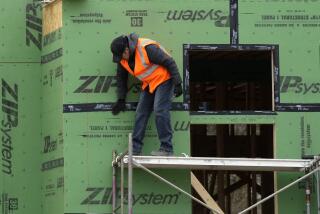Reports Offer Mixed Signals on Direction of U.S. Economy
- Share via
American consumers headed for the holidays in a confident mood, but the news was less cheery for real estate agents and home builders, reports showed Friday.
The University of Michigan reported that consumer sentiment rose to its highest level since July as gasoline prices fell and the job market heated up.
Separately, the Commerce Department said sales of new single-family homes slumped 11.3% in November, the largest one-month decline since January 1994.
“This is consistent with our view that the housing market is likely to continue to moderate in the coming months,” said Patrick Fearon, senior economist at A.G. Edwards & Sons in St. Louis.
The annualized sales rate of 1.245 million new homes fell short of forecasts averaging 1.305 million and was down from a record 1.404 million in October. Sales in November declined in three of the four regions.
Inventories of unsold homes bulged, with about 4.9 months of supply on hand, the highest since December 1996. The median price -- the point at which half of homes sold for more and half for less -- fell 4.1%.
“The data must be considered confirmation of a clear slowing in the housing sector,” said Alan Ruskin, research director at 4CAST Ltd. in New York.
The housing market has had a charmed run in recent years, buoyed by a sustained period of low home mortgage rates. Housing and related industries have been the engine for U.S. economic growth, consumer spending and job creation.
Now, rising interest rates are pinching many potential buyers by pushing monthly mortgage payments higher. Affordability for first-time buyers has fallen to 20-year lows.
“The real estate market has been an underlying source of support for private consumption,” said Brian Dolan, director of research at Gain Capital in Bedminster, N.J. “As that market begins to slow and weaken, that would have an impact on private consumption.”
The University of Michigan’s final sentiment index for December rose to 91.5 from a preliminary reading of 88.7 and was up from 81.6 in November. Wall Street economists had forecast a reading of 89.0.
Late-summer jitters associated with Hurricane Katrina and $3-a-gallon gasoline have faded, pushing the sentiment index higher. “This stronger consumer sentiment may yet translate into solid core consumer spending for the holiday season,” said Steven Wood, an economist with Insight Economics in Danville, Calif.
The government also reported Friday that new orders for U.S.-made durable goods surged in November on a jump in civilian aircraft purchases. Non-transportation orders slid as defense outlays tumbled.
The 4.4% rise was the largest in overall durable goods orders since May, trouncing economists’ forecasts for a rise of 1% in orders for expensive items built to last three years or more.
More to Read
Inside the business of entertainment
The Wide Shot brings you news, analysis and insights on everything from streaming wars to production — and what it all means for the future.
You may occasionally receive promotional content from the Los Angeles Times.










